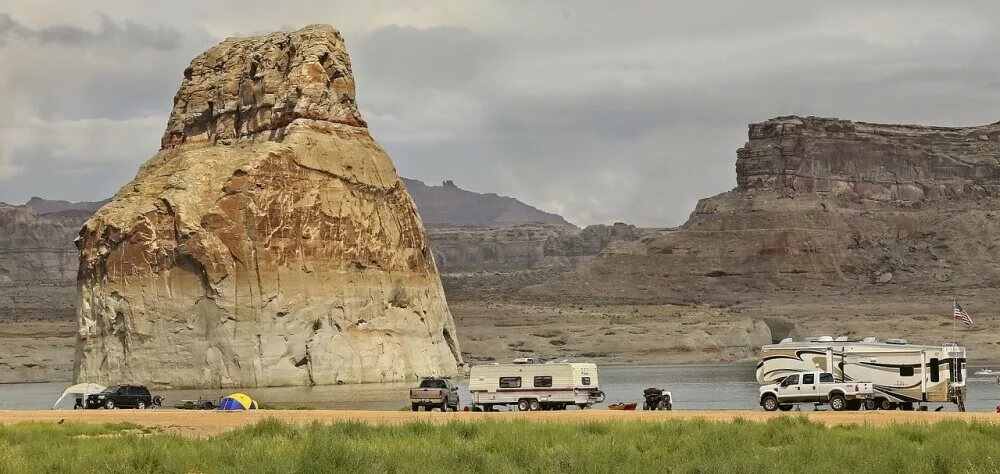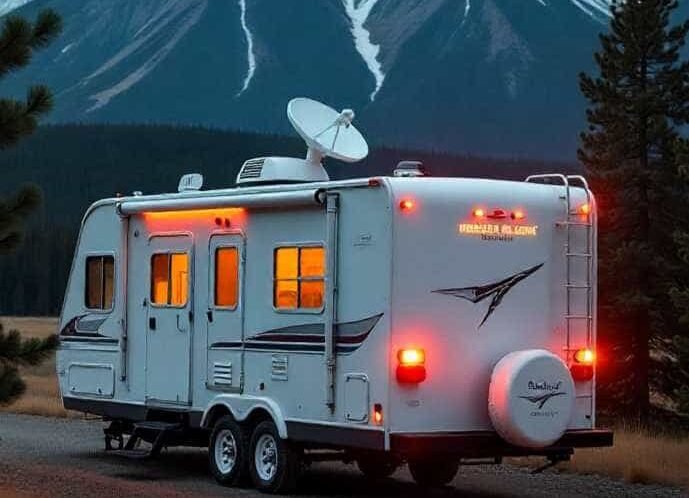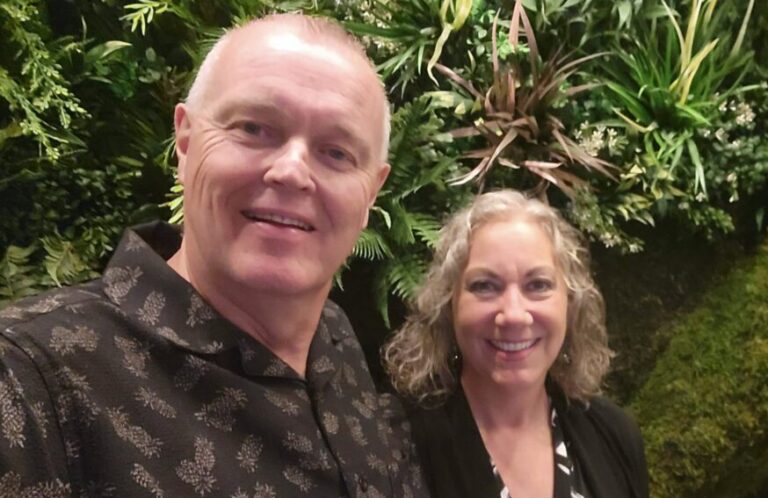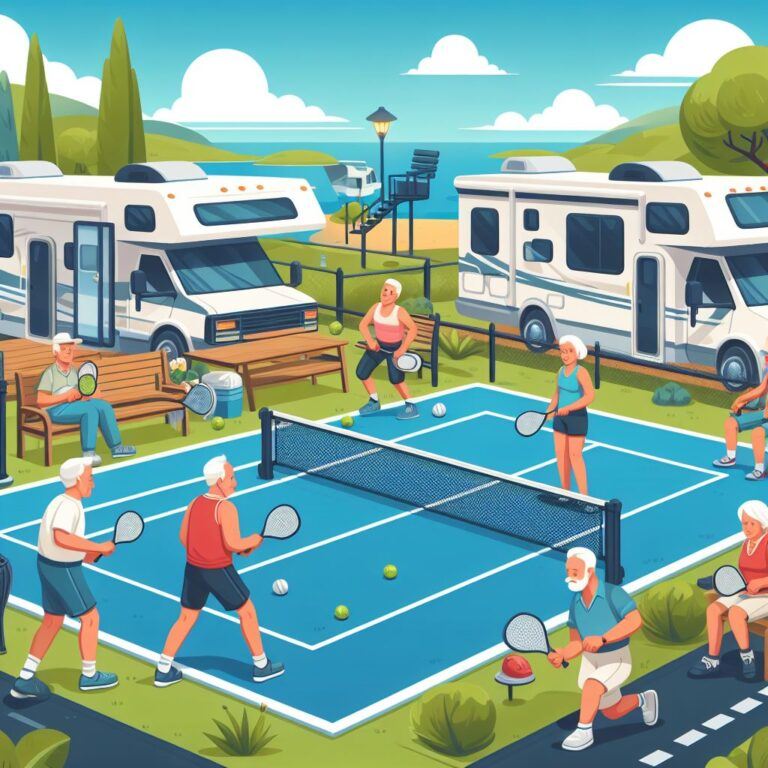Pros And Cons Of RV Living
First, a little bit about Scott and Amie. My name is Scott, and together with my wife, Amie, we’ve been navigating the full-time RV lifestyle since 2021. As the former owners of a traditional home in New Hampshire, we made a significant shift when we decided to sell our house and take our lives on the road. Our vlog, TheRoadRoamers, chronicles our journey, sharing insights and lessons that we’ve amassed along the way.
- The decision to transition into an RV wasn’t taken lightly. It meant embracing minimalism and learning to live with less, a challenge we both were eager to undertake. My background in autobody work for over 27 years provided a foundation of skills essential for RV maintenance and repairs. Any issues that have surfaced during our travels gave me a chance to roll up my sleeves and learn even more. Amie’s experience in real estate for 25 years in New Hampshire was an invaluable asset, especially when it came to meticulous planning and preparing for trips. From forecasting our route to organizing meals, her expertise ensured our journey was as smooth as possible.
- Full-time RV living opens up a world of possibilities especially popular among retirees seeking adventure, families looking for enriching experiences, and individuals or couples engaged in remote work. It allows for unparalleled freedom, but comes with its unique set of challenges.
In determining if full-time RV living suits you, consider aspects such as lifestyle preferences, the practicalities of downsizing, and whether you crave the stability of traditional housing or the dynamic movement of life on wheels. As you continue to the next section, we’ll delve into the day-to-day realities of RV living, parsed through the lens of our experience, and aimed to equip you with a candid perspective on this distinct way of life.

The Realities of RV Living
- Embracing the Life of a full-time RVer comes with a complex set of realities that Amie and I have come to know intimately. One of the very first considerations is the comfort of our furry companion Molly – a soft-coated Wheaton Terrier. Traveling with pets means adapting the space for their needs, ensuring their comfort during travel, and staying on top of their healthcare. It’s a joy to see them adapt, but it’s not without its hurdles.
- Another Critical Aspect to consider is the cost comparison between RV living and traditional housing. Sure, you might forgo a mortgage or rent, but the costs don’t vanish. There are campground fees, maintenance, fuel, and not to mention, the initial investment in the RV itself. However, living in an RV CAN cost less that the traditional sticks and bricks home. Amie’s knack for meticulous planning has been instrumental in crafting a budget that keeps us on track – a necessary strategy for anyone considering this lifestyle.
- Living Off-Grid is something we’ve dabbled in, appreciating the tranquility it offers. The advantages are clear: freedom, self-reliance, and an unrivaled connection with nature. However, it demands a significant investment in the right equipment, like solar panels and water filtration systems, and a strong willingness to learn.
- Environmental Impact: Living in an RV offers a range of positive environmental aspects compared to a traditional sticks-and-bricks home. The smaller living space in an RV often translates to reduced energy consumption for heating and cooling. Additionally, many RVers embrace a minimalist lifestyle, leading to less overall resource consumption and a smaller carbon footprint. RV dwellers frequently engage in off-grid living, utilizing solar panels and other sustainable technologies to generate their power, decreasing reliance on traditional energy sources. Furthermore, the mobility of RV living allows individuals to choose eco-friendly campsites, immerse themselves in natural surroundings, and adopt a closer connection to the environment. This mobile lifestyle often encourages a heightened awareness of one’s ecological impact, promoting a more sustainable and environmentally conscious way of life.
Transitioning smoothly towards practical aspects in the next section, it’s important to highlight that adopting an RV lifestyle isn’t just about embracing freedom – it’s also about adjusting to a new set of daily logistics and learning to manage resources wisely.

Life on the Road: Practical Aspects
- Health Care: I remember sitting with Amie, combing through all the considerations that come with transitioning to an RV lifestyle. One topic that came up frequently was how we would manage healthcare on the go. For travelers like us, healthcare options for RV dwellers are a critical piece of the puzzle. Access to telemedicine can been a game-changer, and some insurance plans now cater specifically to those living a nomadic lifestyle. Keeping up with regular check-ups when you pass through larger towns can become part of your yearly routine.
- RV Living with Children: With your eye always on the next horizon, the experiences you will be able to provide for your family comes with unique advantages. RV living with children means education extends beyond the four walls of a classroom, instilling a sense of wonder and adaptability in them. State and National parks can serve as science and history lessons, while campground friendships teach valuable social skills. Many families find camaraderie on the road in RV groups and clubs such as the Fulltime Families community. Amie and I are often envious of young families because of all the tools they have access to for their on-line learning. We didn’t have any of that when Amie home-schooled our kids.
- Mail Forwarding: You can’t forget about the mail. Yes, even in a digital age, managing mail while full-time RVing presents its own set of logistical challenges. Mail forwarding services like the one offered by Escapees RV Club have become our lifeline, ensuring that we receive important documents and parcels no matter where we have our jacks down. We’ve learned the importance of planning ahead and staying organized with deliveries, ensuring there’s always a campground host or a local post office that can hold items for us.
- Wi-Fi Signal Strength: And let’s not overlook the role of technology for comfortable RV living. You can outfit your rig with a robust Wi-Fi booster and cellular data setup that allows you to stay connected for work and personal reasons. The right tech can often mean the difference between a frustrating experience and a fulfilling one. And trust me, as someone who’s had to troubleshoot more than his fair share of tech issues, I’ve made certain our mobile home is as connected as it is cozy.
With the next destination calling, I often reflect on how integral these practical aspects have become to our RV lifestyle. They set the scene for the life you lead, punctuated by breathtaking vistas and the joy of discovery. Yet, perhaps the more mundane matters, like logistics and planning, play an equally crucial role in supporting this life of freedom and adventure.

Choosing Your Path: Logistics and Planning
I learned quickly that choosing the right RV isn’t a decision to take lightly. It’s vital to consider what ‘long-term living’ means for you. For some, it might be a compact space that’s easy to lug around, while for others, like us, it might mean having enough room to comfortably live and work. Here’s where our background really helped us—my expertise in autobody work allowed us to weigh the maintenance aspects confidently, and Amie’s knack for real estate gave us an edge in assessing spaces and features that would fit our lifestyle.
- Working from Home in an RV isn’t just picking a spot with a view—it’s about connectivity and creating a space that can morph into an office. We had to ponder the pros and cons—yes, the views are unbeatable, but then there are internet issues, distractions, and space constraints to consider. This is a daily situation for many, and our vlog viewers often see how we tackle these challenges head-on.
- Campground Amenities: Time and again, we’re reminded of the importance of campground amenities or the lack thereof. When you evaluate campgrounds, think about whether they meet your vital needs, such as power, water, sewer hook-ups and safety. Drawbacks aren’t just inconveniences; sometimes they necessitate a change of plans or even destinations. We have had moved within the campground to a more suitable spot on more than one occasion. I even had a bad feeling one time about a place we were going to camp at, and so I decided to look up the reviews, and they were horrible. Needless to say Amie found us a better spot for the night right away. That was a rare event due to Amie’s detailed planning abilities.
- Legalities of it All: These logistics become more complex when they intersect with legalities. Changing states means new rules and regulations for full-time RVers like us. From vehicle registrations to state taxes and even voting, it’s a legal puzzle that requires due diligence. There are options for establishing a domicile in certain states and careful research, knowing your specific needs, should point in you the best direction for your situation. Our current domicile is in Florida through Escapees RV Club and has worked well for us and our particular needs.
In my years of experience, I’ve learned that preparation isn’t just about the thrill of the open road; it’s also about foreseeing and planning for the myriad of situations you’ll inevitably face. Whether it’s Amie’s hours of meticulous trip planning or my tool kit for impromptu RV repairs, our collective expertise helps paint a realistic picture of full-time RV living for our followers.

Community and Lifestyle
- Embracing a nomadic lifestyle through RV living has led to an abundance of rich personal experiences, as well as a few challenges. Amie and I have adapted to the shifts in social dynamics and found a sense of community that is unique to RV living. The connections made in RV parks, and keeping track of those people we meet on social media sites, have been invaluable, and we’ve seen firsthand the supportive nature of RV communities. The new friends we have made on the road while Full-Time RVing has become the greatest blessing for Amie and I.
- Remote work is a significant aspect of our lives, and while the freedom is unparalleled, we’ve faced challenges such as ensuring consistent internet access and creating work spaces for both Amie and myself. Our vlog, TheRoadRoamers, and now this Blog, Roamers RV Gear showcases these behind-the-scenes aspects of remote work on the go.
- Ensuring RV safety involves a combination of strategic planning and the use of essential safety items. Implementing outside motion lights can be a crucial deterrent, illuminating the surroundings and discouraging potential intruders. Security cameras provide an extra layer of vigilance, offering real-time monitoring and a sense of security when parked in unfamiliar locations. Having a canine companion, like our dog Molly, is an invaluable asset, as dogs not only provide companionship but also serve as reliable alarm systems. Molly’s presence alone acts as a deterrent and enhances our overall sense of security. Regularly communicating your whereabouts with trusted friends or family, choosing well-lit and populated parking spots, and being aware of your surroundings are additional safety measures to consider. By combining technology, strategic planning, and the companionship of a loyal pet, whether you solo RV or with your entire family, these tips can create a safer and more secure living environment on the road.
Closing Thoughts: Living in an RV isn’t just about the places you go; it’s about the lifestyle you lead and the people you meet along the way. It’s living simply, but fully. It’s dealing with maintenance issues on your own terms, like when I have to put my auto body skills to use. It’s about having the expertise from years in real estate to meticulously plan out our trips, as Amie does. It’s about having the RIGHT Camping gear for your RV. If you’re considering this lifestyle, weigh these reflections against your personal circumstances. May your journey be as fulfilling and insightful as ours.
We’ll See You on the Road!
Please be sure to leave a comment below and any question you have will be much appreciated!








I thoroughly enjoyed reading your insightful and candid article about the realities of full-time RV living, Scott. Your personal experiences, shared alongside Amie’s, paint a vivid picture of the joys, challenges, and practical considerations that come with this unique lifestyle. The great thing about your perspective is the fact it adds balance. Many writers rave about the freedom and the adventure, both great aspects, but the challenges and logistics are often overlooked.
Your expertise in auto body work and Amie’s background in real estate shine through, providing valuable context and depth to your experiences. However, I was curious if you had any thoughts on one aspect that didn’t seem to be covered in detail: the psychological impacts of transitioning to full-time RV living. Many people who consider this lifestyle are often coming from a more traditional living situation. Did you and Amie face any mental or emotional challenges in adapting to this new way of life? Were there any strategies or mindset shifts that helped you both adjust?
Hi Catherine.
Thank you so much for your comment, it is much appreciated. As far as your questions – let me attempt to answer them for you.
We lived in a “traditional sticks and bricks” since we were married, although we always dreamt and talked about living in an RV when we retired. Our mindset didn’t need to really change much, honestly. It may be that since we knew we wanted to do this lifestyle for so long, and spent years camping as a family and also going to RV shows and dealerships, that we did move into living this lifestyle more readily and easier than it may be for others.
We don’t recommend just “jumping” into the lifestyle without careful, thought-out consideration and having a plan of how to get there. It took us about 4 years before we actually made the jump once we decided to move forward “now” rather than when we retired. During this time we purged the majority of our possessions, stored the items we weren’t ready to get rid of at that time, and made some general short-term and long-term plans on where we wanted to go and what we wanted to do and see. Flexibility in the full-time RV life is a must! There are a LOT of details to consider before living this lifestyle and we will be covering them in the near future.
I will tell you that the largest emotional challenge is being gone from our family members for extended periods of time. Thankfully, we use FaceTime to keep in touch and we have the ability to haul our home on wheels for visits where our family resides, which is in multiple states. In other words, we make it work and get our family fixes in as needed and wanted.
Hi, another awesome post here. There is a lot to consider about the pros and cons. I never really thought about the cons but they of course exist. Choosing the right campground is the key because if you don’t you have a bad time. Which is a big no no. Just part of the journey. Have a good one.
I will definitely be discussing campground choices in future articles. Each style campground/resort provides a different type of experience. The good news is that if you don’t “like” your current neighbors (perhaps they are really noisy) one of you will be moving sooner than later! Thanks for your comment. Have a great day yourself!
I thoroughly enjoyed reading your blog on living the RV lifestyle. This is a thing I think many people have considered at one point or another. The thought of just hitting the open road and living like a nomad certainly has its appeals. But it was great to read both pros and cons from your experience.
If one were to consider this way of life, do you have more advice on how to deal with health care issues, particularly if one has a condition that needs regular specialists or a family doctor? It sounds like Amie is an expert researcher and has all the angles covered from the insights you’ve provided. However, it would be great if you could provide some suggestions with how to deal with regular medical care while traveling from state to state?
Also, do you ever find it challenging to live 24/7 in such close confines and how do you deal with that? Thanks so much for sharing your experiences. I look forward to checking back with your blog. Happy travels!
Hi Lee.
Thank you so much for reading the article and the great comments and questions!
Health care can certainly be tricky. The first suggestion would be to choose a state for your domicile (home base where you “reside”) that has at least one insurance company that offers nationwide insurance coverage. This is one reason we chose FL as our domicile that we feel will benefit us down the line since BC/BS does offer that here. The second tip we have is, if you have health issues that need regular monitoring, then schedule all your appointments in a time frame in which you will be at your home base. We know of many people that will also fly back to their home base for secondary appointments if they need to be seen twice a year. Of course, most insurance companies do have some coverage for emergency situations, too.
We also have a membership with FMCA (Family Motor Coach Association) which also includes FMCAssist which is emergency medical evacuation and repatriation coverage available to members worldwide as long as you are more than 75 miles from home. If you are a full-time RVer, you are always considered 75 miles from home. FMCAssist services are also available to members when traveling abroad. Some exclusions and limitation amounts pertain to these benefits, yet it is also a great addition to what we already have.
As far as close quarters, we don’t generally have any issues with this, especially since there is a vast world outside to see. We enjoy living tiny and having less material items, and don’t find a need for anything different at this time. We know this may not work for everyone and this lifestyle is not for everyone, yet it works for us.
Thanks!